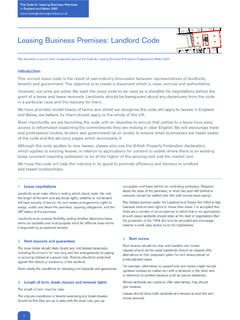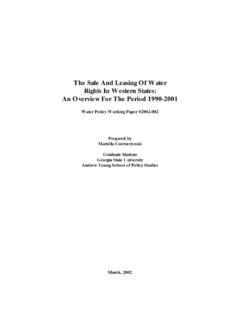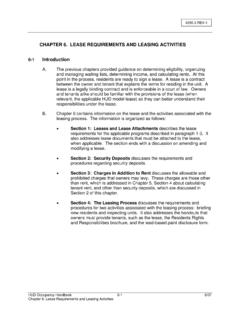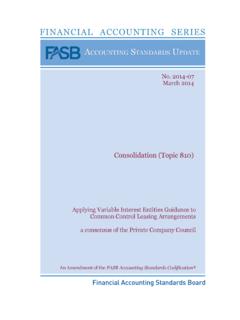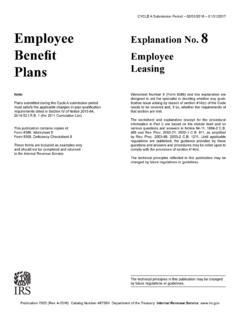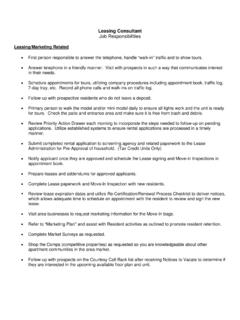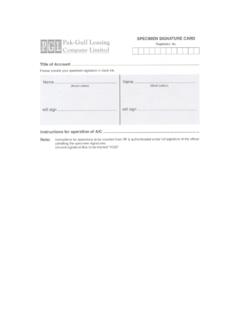Transcription of Leasing Business Premises: Occupier Guide
1 1 Lease negotiationsYou should expect the Landlord to make very clear exactly what youare being asked to should be able to understand the total extent and duration of thecost and liability you will be taking on if you sign a lease based on theterms being offered by the should know from the offer exactly what the property should also remember that, however good your relationship is orseems to be with the Landlord, the Landlord may sell to another party;the terms you agree and the lease you take on must reflect everythingyou rely on to conduct and safeguard your 1 Make sure you understand every term and condition in the offer including the total cost until the lease ends and ask theLandlord or the Landlord s representative to confirm in writingthat the offer meets the Lease 2 Make sure the offer clearly shows the extent of the property,with the boundaries clearly marked on plan and the floor areanoted, together with all means of access, any access or areasyou must share with other occupiers, any limitation of hours ofuse, any restrictions in the type of use, any legal or planninglimitations or obligations that come with the property.
2 IntroductionA Business lease is a legally binding contract between the legal owner (Landlord) and the Occupier (Tenant). Failure by either party to comply with the terms of the agreement could result in court 2007 Code for Leasing Business Premises ( the Lease Code ) provides a framework within which a prospective tenant can reasonably expect a landlord to operate. As a prospective tenant, you should not assumethat a landlord complies with the Lease Code. The Lease Code does not provide all of the protection you need for your Business in Leasing the Landlord is also the tenant of another owner. This may restrict the flexibility of terms the Landlordcan offer. The Landlord should always state in advance if this is so and provide a copy of the current it is proposed to buy an existing lease (assignment) from someone else, be aware that, though parts of thisOccupier Guide may help in interpreting some of the terms of the lease, there may be many additional advice from a qualified surveyor and a lawyer should be this document the following terms have been used:LandlordThis is the owner of the property or the person owning an existing lease of the property TenantThis is the Occupier of the property or the person paying rent to a landlord (this Occupier Guideassumes the tenant will be you)Heads of TermsThis is a summary of the agreement between the parties and is used to instruct lawyers to produce the formal lease.
3 Both the lease and the Heads of Terms should comply with the recommendations of the Lease Code but the Heads of Terms will be superseded once the lease has been more information on the Lease Code seeUseful Code for Leasing Business Premisesin England and Wales 2007 Business Premises: Occupier GuideCopyright The Joint Working Group on Commercial Leases, 2007. Any of the Code documents may be reproduced (other than for commercial publication)without the Group s consent, but only in full, without amendment, and acknowledging the Group s document is one of three component parts of the Code for Leasing Business Premises in England and Wales 2007 Who pays?What is theoccupier scost eachyear?If this costis not fixed,what does itdepend on?How much?How often?Cost TenantRentVATR atesService chargesInsuranceUtilitiesRepairs/Dilapid ationsFitting out/AlterationsTotal each yearTotal lease costYou should request alternative terms if you are not happy with theinitial terms of the Landlord s offer, always bearing in mind that any variation (such as lease length, rent review terms includingfrequency and basis break options, etc) may change the level of rent or other matters, rent deposits and guaranteesThe Landlord should provide full details of your expected costsinvolved in Leasing the property.
4 This should include all personal or company guarantees, security deposits or other bank all costs will be fixed at the time of agreeing the lease. You shouldexpect the Landlord to explain how any costs are calculated so thatyou can understand the risks and make sure you can afford all of thecosts of Leasing the the Landlord demands a deposit, you should make sure youunderstand the conditions under which it is held and the basis on which it will be returned to you. You should remember that this is YOUR money that the Landlord is holding as a protection againstany failure on your you are asked to give a personal guarantee, you should avoid usingyour home as security. You should be able to understand both whenand how the Landlord may call on your guarantee, and also what theguarantee would actually 3 Make sure the offer sets out clearly who the Landlord is,together with any superior landlords, and assume that anyLandlord will sell his interest to someone else and that you willhave to deal with the new 4 Request written responses from the Landlord, where you expectto need to rely on them.
5 Check that all the things which areimportant to you and your Business have been accuratelywritten down in the Heads of Terms and documented in 5It may be helpful to use a checklist (such as that set out below)so that you can ask the Landlord to be explicit about costs andobligations in the 6 Keep thinking of the deposit as your money and demand thatinterest on it is accrued at a fair rate. Ask the Landlord tomake sure it is held in an account that belongs to you (escrowor stakeholder account) in case the Landlord becomesinsolvent. Throughout the term of the lease, make sure youobtain statements from the Landlord to confirm that the moneyis still in the account and that all interest earned has been paidto you or, if required by the lease, has been held on yourbehalf within the account. Check that your deposit will betransferred to the new Landlord if the Landlord sells theproperty to another 7 Make sure you know when and how you can get your depositback, such as when you no longer have an interest or havesatisfied agreed 8 Think of any guarantee as if it WILL be called on the first day ofthe lease; what would be the personal consequences for you?
6 Can you afford it?2 The Code for Leasing Business Premisesin England and Wales 2007 reviewYour lease may contain provisions allowing the Landlord to changethe rent. The rules by which the rent can be changed should be clearand understandable. It should be arranged that the Landlord cannotsimply impose a rental increase. The basis of rent review should be to the market rent unless clearly stated otherwise. If you agreedincreases fixed to an index, the basis should be a published,independent, authoritative source. If there is an open market rental value provision, it should specificallyexclude (or disregard) any improvements you make, other than as partof an explicit obligation, or any value arising from your Business . Youshould also make sure there are controls in the event of disagreementthat will be referred to an independent expert or arbitrator to lease should include a provision allowing you to serve a rentreview notice on the Landlord.
7 If the Landlord does not initiate therent review, think very carefully before deciding not to serve notice on the Landlord as you may be responsible for paying interest on any increase in rent above the original rent from the appropriate rent review date until the review has been and assignmentSubletting (creating a new lease of all or part of the property)If your lease allows subletting, you should understand any limitations(in terms of the amount of space, the use and the rent you can chargeand the nature of the subtenant you can sublet to). It is usual for Landlords to insist that subleases are granted outsidethe protection of the Landlord and Tenant Act 1954 and on similarterms to your careful that restrictive subletting provisions do not prevent youfrom, say, sharing your space with a supplier or service provider (for example, an outside cleaning company which you provide with its own cleaner s cupboard)Landlord s written consent is likely to be required for (disposing of your existing legal interest in the whole premises)It is common for Landlords to require you to guarantee the lease once you have assigned it to a third party.
8 The form of guarantee (an Authorised Guarantee Agreement or AGA) usually makes youresponsible, as a guarantor, for the lease obligations until yourassignee (the person to whom you sold your lease) assigns the lease to another Landlord should not impose any condition which requires you to be in compliance with the lease at the time of 9 Check that you understand the basis on which the rent can bechanged. Can the rent go down as well as up? You should seeif the Landlord is prepared to allow upward or downward rentreviews and if not, you should consider asking for a breakoption exercisable only by the tenant. Tip 10 Make sure that the interest rate on the difference is no higherthan bank base rate. Try to introduce a provision whereby theLandlord forfeits interest on the difference if he/she does notinitiate the rent review process prior to the review 11 Avoid strict time limits in the rent review clause (other thanreferred to in Tip 10) these could result in you losing theability to 12 Try to make sure you are NOT required to sublet at the same orhigher rent than you pay.
9 You should not be limited other thanby reference to the market rent at the time of the 13 Ask your Landlord to reflect the flexibility you require in thesharing provisions of the lease. This probably means you mustnot create a tenancy for your 14 Make sure your Landlord, including any superior landlords, isrequired to give consent within a defined (and short) period oftime and that he is not allowed to refuse without good 15 Ask the Landlord to limit his requirement for an AuthorisedGuarantee Agreement to those cases where your proposedbuyer (assignee) is financially weaker than you are at the date ofassignment. Ask the Landlord to include provisions that willallow you to cancel the Guarantee if defined conditions are metand/or after an agreed 16 Try to agree alternative conditions to avoid you having to enterinto an Authorised Guarantee Agreement (for example, byhaving the new tenant pay a rent deposit).
10 Tip 17 Try to make sure the only precondition for assignment isobtaining the Landlord s consent in writing and that theLandlord may not unreasonably withhold or delay giving Code for Leasing Business Premisesin England and Wales 2007 length, break clauses and renewalsThe Landlord should make clear the length of the lease, whether thereare any rights to break the lease and whether you will be entitled toan extension of the lease on expiry (see section 11 below).Make sure that the length of the lease is appropriate for your businessneeds; ask the Landlord to offer you a break option exercisable onlyby the tenant (this will be you unless you have assigned your lease) to give you the opportunity to cancel the lease at a time that suitsyour Business . A right to break should allow you to walk away from the lease at a given time after informing the Landlord in writing. This should beconditional only upon having paid the rent due under the lease andgiving up occupation of the property, leaving behind no continuingsubleases.


